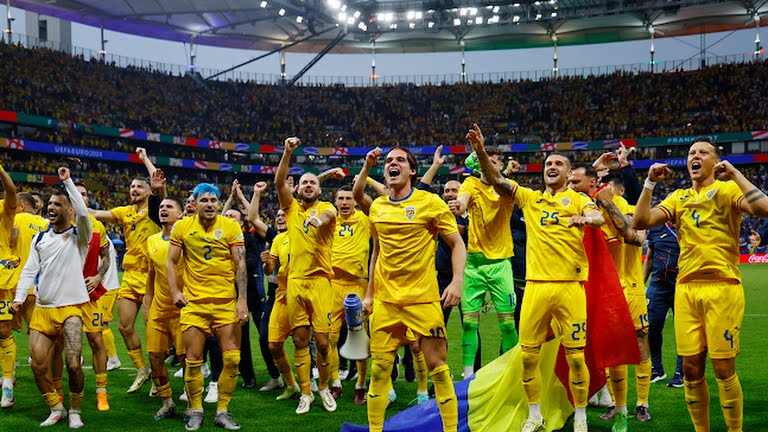So much for the “Disgrace of Gijón” part two. Romania and Slovakia may have got the result they knew beforehand would guarantee both countries escaped from Group E, but there was no scintilla of a stitch‑up. Unlike the notorious match between Germany and Austria in 1982, this game was not played at walking pace but full throttle, with chances galore, even in the middle of an apocalyptic thunderstorm.
Ondrej Duda’s powerful header was cancelled out by Razvan Marin’s penalty and that meant Romania qualified top of the group, while Slovakia went through too as one of the best third-placed sides. With a crowd three‑quarters Romanian it felt like a home fixture at times, and the atmosphere was remarkable with noise and pyrotechnics throughout, but these were two evenly matched teams and a draw was a fair result. Honest.
“There are some people who should apologise to us regarding the position we took towards this game,” Edward Iordanescu, the Romania manager, said after the match of stories of a possible non-aggression pact. “Everyone did their best to throw mud at the teams, at our work and our dignity. It was shameful. They should have waited before judging us, but they threw this garbage not just at us but our opponent. If we were going to lose and go home we would have done so with our dignity intact.”
It is true that while both coaches had promised to go for victory before the match began, few people believed them. But immediately from kick-off it was clear that the tempo was too high, in temperatures approaching 30C, to reflect a pre-conceived stalemate. Slovakia had the opening chance of the game, and scored the opening goal, Duda making no mistake with a forceful header from Juraj Kucka’s peach of a first-time cross.
Such were the intricate permutations of Group E that this one goal put Slovakia top of the group and Romania bottom. Ten minutes later and it flipped again. Romania equalised from a penalty slammed home by Marin, who again tore off in delight like a wild man. But the spot kick was awarded only after lengthy consideration by VAR, after the referee, Daniel Siebert, had initially watched David Hancko bring down Ianis Hagi and adjudged the foul to be outside the box. To be fair to the German official, it did appear first contact was made outside, but Hancko followed through to catch Hagi a second time inside the box and the decision was overturned.

A delighted Iordanescu said this result marked a historic moment for his country, a new set of heroes to replace the golden generation that were coached by his father, Anghel. “I think people will be proud of this team for a long time. These lads deserve everything because of who they are. We gave our all, we never gave up. Today it didn’t work out well at the beginning but we came back. I am proud of them and now we are going to continue; with heart, intelligence and balance.
About 10 minutes into the second half, something extraordinary happened. A thunderclap so loud that it drowned out the noise of 50,000 fans announced the sudden and entirely unpredicted arrival of an enormous storm, which within minutes was hurling squalls of rain on to the players. It was like playing on the high seas, a drastic change in conditions that the man of the match Stanislav Lobotka said he had never experienced before. But it affected the tempo of play not a jot. Only in the closing stages, with the game disrupted by a constant flow of substitutes as much as anything else, did it seem like the sides were willing to accept the outcome that suited them both.
“It means a lot because I remember where we started,” Slovakia’s Italian coach, Francesco Calzona, said of his team’s qualification. “We were ranked No 55 in the world, so to get here, the last 16, with a very good qualificaton round makes me really proud – but when this team plays good football I’m happy.”
Calzona had praise for his opponents as Iordanescu did for the Slovaks and both coaches celebrated the fans who made the match such an occasion. All four sides of the ground roared at the final whistle and joined in a lusty rendition of Freed from Desire. “I saw most of the fans were Romanian but I like Romanians,” said Calzano. “We are a small country but I am glad to give the fans pleasure.”
For Iordanescu the pride was more visceral. “I don’t know what we can do in future but I must take a moment to congratulate the fans. Almost the whole stadium wore yellow. They have followed us to the hotel through the city and on trips, and I want them to know the boys are aware of the support they give. It is absolutely incredible and I hope it will continue. Romania has talent and potential. It has found its spirit and it must never lose it again.”








More Stories
Amorim insists Fernandes not leaving Manchester United amid Madrid reports
How debt burden pushed Nigerian boxer Segun Olanrewaju to a fight that took his life
Nigeria Taekwondo Federation boss, Abdullahi Saidu dies at 53